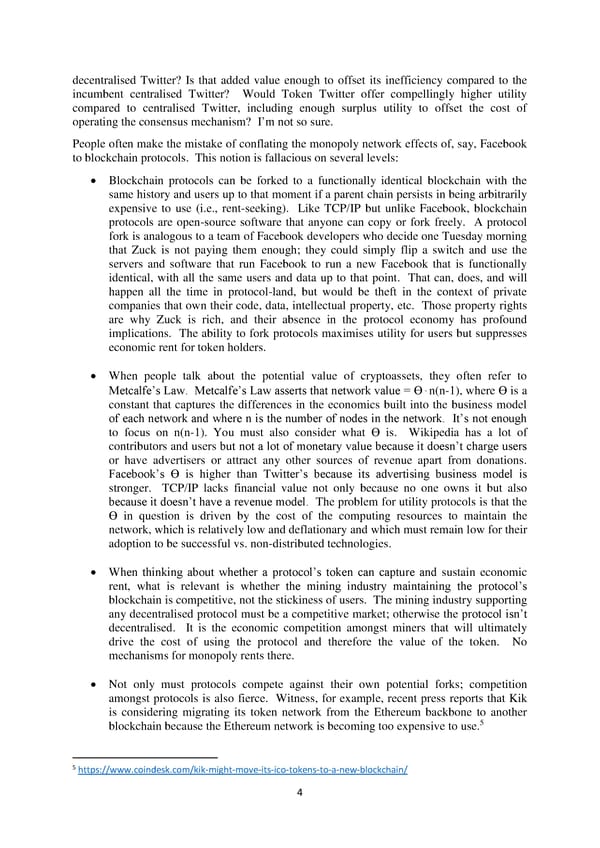decentralised Twitter? Is that added value enough to offset its inefficiency compared to the incumbent centralised Twitter? Would Token Twitter offer compellingly higher utility compared to centralised Twitter, including enough surplus utility to offset the cost of operating the consensus mechanism? I’m not so sure. People often make the mistake of conflating the monopoly network effects of, say, Facebook to blockchain protocols. This notion is fallacious on several levels: • Blockchain protocols can be forked to a functionally identical blockchain with the same history and users up to that moment if a parent chain persists in being arbitrarily expensive to use (i.e., rent-seeking). Like TCP/IP but unlike Facebook, blockchain protocols are open-source software that anyone can copy or fork freely. A protocol fork is analogous to a team of Facebook developers who decide one Tuesday morning that Zuck is not paying them enough; they could simply flip a switch and use the servers and software that run Facebook to run a new Facebook that is functionally identical, with all the same users and data up to that point. That can, does, and will happen all the time in protocol-land, but would be theft in the context of private companies that own their code, data, intellectual property, etc. Those property rights are why Zuck is rich, and their absence in the protocol economy has profound implications. The ability to fork protocols maximises utility for users but suppresses economic rent for token holders. • When people talk about the potential value of cryptoassets, they often refer to Metcalfe’s Law. Metcalfe’s Law asserts that network value = ϴ ּ n(n-1), where ϴ is a constant that captures the differences in the economics built into the business model of each network and where n is the number of nodes in the network. It’s not enough to focus on n(n-1). You must also consider what ϴ is. Wikipedia has a lot of contributors and users but not a lot of monetary value because it doesn’t charge users or have advertisers or attract any other sources of revenue apart from donations. Facebook’s ϴ is higher than Twitter’s because its advertising business model is stronger. TCP/IP lacks financial value not only because no one owns it but also because it doesn’t have a revenue model. The problem for utility protocols is that the ϴ in question is driven by the cost of the computing resources to maintain the network, which is relatively low and deflationary and which must remain low for their adoption to be successful vs. non-distributed technologies. • When thinking about whether a protocol’s token can capture and sustain economic rent, what is relevant is whether the mining industry maintaining the protocol’s blockchain is competitive, not the stickiness of users. The mining industry supporting any decentralised protocol must be a competitive market; otherwise the protocol isn’t decentralised. It is the economic competition amongst miners that will ultimately drive the cost of using the protocol and therefore the value of the token. No mechanisms for monopoly rents there. • Not only must protocols compete against their own potential forks; competition amongst protocols is also fierce. Witness, for example, recent press reports that Kik is considering migrating its token network from the Ethereum backbone to another blockchain because the Ethereum network is becoming too expensive to use.5 5 https://www.coindesk.com/kik-might-move-its-ico-tokens-to-a-new-blockchain/ 4
 Investor’s Take on Cryptoassets by John Pfeffer Page 3 Page 5
Investor’s Take on Cryptoassets by John Pfeffer Page 3 Page 5